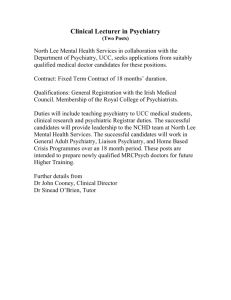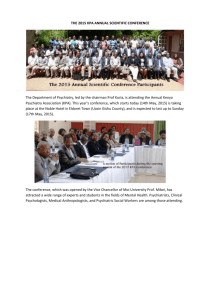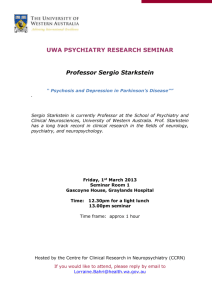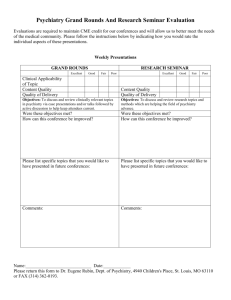General Adult Psychiatry and Medical Psychotherapy
advertisement
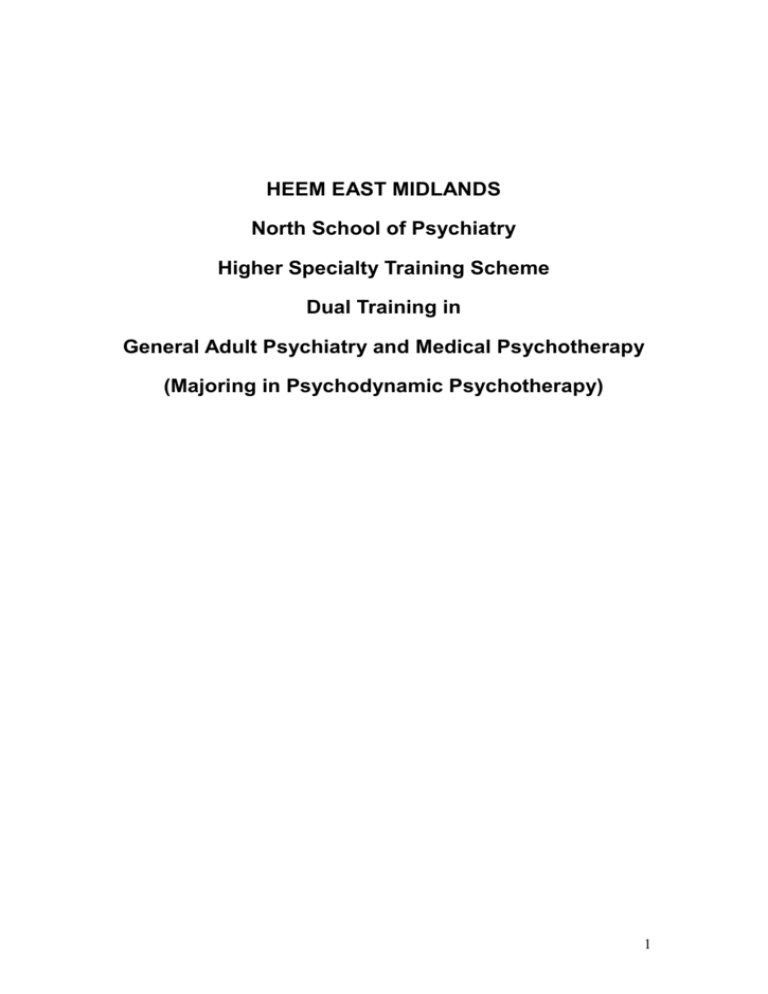
HEEM EAST MIDLANDS North School of Psychiatry Higher Specialty Training Scheme Dual Training in General Adult Psychiatry and Medical Psychotherapy (Majoring in Psychodynamic Psychotherapy) 1 This post provides a 5 year training leading to dual CCTs in General Adult Psychiatry and Medical Psychotherapy. The training is comprised of postings within the well established higher training programmes for General Adult Psychiatry and Medical Psychotherapy within the East Midlands (North) School of Psychiatry. The post-holder will have attained core competencies in psychiatry, have membership of the Royal College of Psychiatrists and be appointable at interview for higher training in both General Adult Psychiatry and Medical Psychotherapy. The programme is guided by an awareness of the need for the delivery, supervision and promotion of psychotherapy in a range of general psychiatric settings and for the integration of general psychiatric practice and principles within specialist psychotherapy settings. The structure of the training programme is as follows: Year 1 General Adult Psychiatry (core experience) 8 sessions. Psychotherapy 2 sessions. Year 2 General Adult Psychiatry (core experience) 8 sessions. Psychotherapy 2 sessions. Year 3 Medical Psychotherapy (core experience) 8 sessions. General Adult Psychiatry 2 sessions. Year 4 Medical Psychotherapy (core experience) 8 sessions. General Adult Psychiatry 2 sessions. Year 5 Medical Psychotherapy with opportunities for integration. 10 sessions. The weekly special interest sessions will come from General Adult Psychiatry in years 1 and 2 and from Medical Psychotherapy time in years 3, 4 and 5. The main priority will be to cover the core parts of both the General Adult Psychiatry and Medical Psychotherapy curricula. Once this has been achieved it will be possible to develop appropriate special interest work with cross-over between the two specialties. There will be room for reasonable flexibility according to the individual needs of the post-holder. Throughout the programme the trainee will have educational planning meetings and appraisal with supervisors from both the Medical Psychotherapy and General Adult Psychiatry programmes. The post-holder will take part in the General Adult Psychiatry on call rota throughout their training. Section 1 describes the General Adult Psychiatry training programme and Section 2 describes the Medical Psychotherapy training programme. 2 Section 1 Training in General Adult Psychiatry The rotation comprises 30 posts (including 3 Lecturers) rotating around 53 modules 11 POSTS -Nottinghamshire Healthcare NHS Trust -Nottingham 6 POSTS -Nottinghamshire Healthcare NHS Trust -Mansfield 1 POST -Nottinghamshire Healthcare NHS Trust -Forensic 6 POSTS -Derbyshire Mental Health Services NHS Trust 2 POSTS -Lincolnshire Partnership NHS Trust The scheme overlaps flexibly with a similar scheme for Training in Old Age Psychiatry. The above numbers per location include Old Age and General Psychiatry Specialty Trainees. The rotational training scheme is approved by PMETB. Contracted Hours The hours of duty attached to each post will be the standard working week of 40 hours. The banding supplements vary according to the post. Principles of Training and Duties of Rotational Training Posts During years 1 and 2 the post holder will undertake 8 service sessions in placements offering core General Adult experience (multi disciplinary team work, home assessments and other acute work). It is likely that at least one of these posts will be outside of Nottingham. The order in which attachments in the rotational scheme take place will be decided by the Specialty Trainee Training Committee, taking into account the preferences and experiences of the Specialty Trainees and following discussion with their Training Programme Director. The trainees will hold an annual allocation meeting at which most of the decisions on placements will be taken. The TPD (General Adult) will make final decisions, particularly where these cannot be decided at the allocation meeting. During these attachments the post holder will participate in teaching and supervising junior staff and undergraduates, in the day to day running of the team during their Consultant's absences, the duty rota and supervising clinical services. In years 3 and 4 the post holder will continue to have 2 sessions per week in general adult psychiatry. The content of these sessions will be planned and agreed with the educational supervisor. Year 5: Medical Psychotherapy with integration opportunities. Please see page 10 for more information. Organisation and Supervision of the Rotational Scheme The Specialty Trainee rotation in General Adult Psychiatry is administered and organised by the East Midlands School of Psychiatry Specialty Training Committee for General Adult Psychiatry (Chair, Dr Tuhina Lloyd, Training Programme Director GA). Specialty Trainees also have their own group, the membership of which includes not only the General Adult Specialty Trainees, but also those in Old Age, Child Psychiatry, Psychotherapy and Lecturers. Three Specialty Tutors offer Educational Supervision, Career Guidance and Mentoring to the Specialty Trainee overseen by the Training Programme Director. 3 Hospitals and Departments Involved In the Specialty Trainee Rotation The Nottingham Hospitals (Nottinghamshire Healthcare NHS Trust) University Hospital, Queen's Medical Centre This is a large university hospital based in Nottingham city approximately 2 miles from the City centre. There are 2 gender specific general adult psychiatry wards with a total of 42 beds. There is also a section 136 suite (Cassidy suite) housed between the two wards which represents the primary place of safety for 136 patients in Nottingham city and south county. There is a mother and baby unit and community team also based at the QMC site. The Department of psychological medicine based at QMC provides psychiatric liaison to the general hospital (as well as to the other general hospital in Nottingham – city) and also completes self harm assessments in A&E and on medical wards Highbury hospital. Highbury hospital is based within Nottingham city around 5 miles north of the city centre in the area of Bulwell. There are 4 purpose built gender specific general psychiatric wards based on this site (16 beds each) and a male only psychiatric intensive care unit (10 beds) –total 74 beds. The acute community assessment and treatment service including crisis services are based here. This is a community mental health team dealing with new onset mental disorders in Nottingham city and following service users up for up to one year. Stonebridge centre. This houses the Nottingham city recovery and assertive out reach community teams and also has a crisis/home treatment service for Recovery/AO clients. The recovery team manages clients with severe and enduring mental health conditions. Westminster House. This is a small site in Mapperley in Nottingham city where early intervention in psychosis services are based. Nottinghamshire South County. Outside of Nottingham city are the 3 boroughs of Rushcliffe, Gedling and Broxtowe each of which includes primarily suburban areas which make up part of the Nottingham conurbation. Each area has it’s own community mental health team which serves both new onset and recovery functions. Service users from these areas are admitted to the wards at either QMC or Highbury alongside city service users. County crisis services are based within Highbury hospital at present The Derby Hospitals (Derbyshire Mental Health Services NHS Trust) The Mental Health Service in Derby is based at a new-built Psychiatric Unit at Derby City Hospital. There is a Mental Health Resource Centre a few minutes drive away at the Derby Royal Infirmary site. This includes a new outpatient suite and a Day Hospital for City patients. There are Community Mental Health Teams in all sectors. 4 There are well-established services for Older Adults, Rehabilitation, Psychotherapy, Drug and Alcohol and Child and Adolescent Mental Health, as well as Forensic and Liaison psychiatry. The Specialty Trainee Trainers are Drs R Denny, S Gillespie, Brownsett, E. Komocki and S Thacker. Derby offers excellent opportunities for research, audit and a wide variety of specialist interest sessions in various clinical services or in management training. The Specialty Trainees make an active contribution to the postgraduate training programme. This includes weekly cases, seminars, journal club meetings and the teaching of junior trainees and medical students. The Lincoln Hospitals (Lincoln District Healthcare NHS Trust) The Department of Psychiatry in Lincoln County Hospital is a modern purpose built development which opened to patients in May 1987. It is situated next to the main District General Hospital in Lincoln and is part of a far reaching phased redevelopment of all medical facilities. The hospital is situated within a mile of the centre of Lincoln and within walking distance of the richly historical Cathedral and medieval area of Lincoln. The Psychiatric Medical Staff associated with the Department of Psychiatry include fifteen Consultants, three Specialty Trainees, ten Core Trainees and six staff grade doctors. There is an active, lively Postgraduate Training Programme run by the Clinical Tutor and the Specialty Trainee will be expected to contribute to the organisation and teaching of the programme and to help Junior Doctors work towards their MRCPsych. exams. The Specialty Trainee will be encouraged to take part in local research and there is a good Psychiatric Library with the services of an excellent Librarian. There are two General Adult Psychiatry placements in Lincolnshire both currently based in Grantham. These are: 1. Dr C Lewis - Grantham 2. Dr R Aziz - Grantham Opportunities exist for two supervised elective sessions in (a) the Department of Psychotherapy in Lincoln under Dr G Fisk, Consultant Psychotherapist, (b) Forensic Psychiatry under the supervision of Dr P Barczak or (c) an elective of their own choice. The timetable is structured so that the Specialty Trainees has a clear opportunity to pursue their elective sessions or for research. The whole of Wednesday is left free to allow the Specialty Trainee to be in Nottingham on the day on which academic events are most likely to take place there. Friday all day is also kept free for electives. The Specialty Trainee would normally join the Lincoln second on-call rota with consultant cover. This is on-call from home and the appropriate supplement would be payable. The Mansfield Hospitals (Nottinghamshire Healthcare NHS Trust) This part of the trust serves a population of 300,000. This includes two large towns; Mansfield, a predominantly industrial and mining town and Newark (60,000), a medieval market town, together with surrounding suburbs, small mining towns and agricultural areas. The Acute Services, Day Hospital and Rehabilitation Services for the health district are provided in a new purpose built Psychiatric Unit, the Millbrook 5 Unit in a large modern District General Hospital, King's Mill Hospital, Sutton in Ashfield. There are community resource centres in Newark, Mansfield and Kirkby in Ashfield together with ESMI continuing care beds in locally placed community hospitals and continuing care beds for the functionally mentally ill in domestic style bungalow units throughout the district. There are six Consultants in Adult Psychiatry, two in Rehabilitation Psychiatry, three in Old Age Psychiatry, two in Child & Adolescent Psychiatry and two in Learning Disabilities. There are six StRs, five established Specialty Trainee posts in General Adult Psychiatry, one established Speciality Trainee post in Old Age Psychiatry and one Specialty Trainee post in Learning Disabilities. The junior medical staff are all on the joint rotations with Nottingham. The services are fully sectorised and community oriented. There are seven Specialty Trainee level posts in Adult Psychiatry. Mansfield Sector, Mansfield Sector, Mansfield Sector, Ashfield sector, Rehabilitation and Early Intervention, Rehabilitation, Assertive Outreach and EIP, Newark Sector Dr Hugh Middleton (Senior Lecturer) Dr Hosam Abed Dr Gbenga Odeymi Dr Kasha Wood Dr Jane Tarrant (Mansfield/Ashfield) Dr Tuhina Lloyd (Newark) Dr Caroline Innes The Specialty Trainees are expected to make a substantial contribution to the postgraduate training programme which includes Case Conferences, Journal Clubs and Clinical Audit, together with teaching and supervising the medical students. Rampton Hospital (Nottinghamshire Healthcare NHS Trust) Rampton Hospital is one of the three High Security Hospitals in England and Wales for patients who require treatment under conditions of special security on account of their dangerous, violent or criminal propensities. The hospital has 450 patients. Services include: Male Mental Illness, Male Personality Disorder, Dangerous and Severe Personality Disorder, National High Secure Learning Disability, Deaf Service and National High Secure Healthcare Service for Women. Major Clinical Sessions Based at Rampton Hospital with potential of experience at other levels of security and prisons. The trainee will, in discussion with the Training Programme Director be able to choose from a range of placements. Presently Dr S Elcock is approved as a trainer for the General Psychiatry scheme. Other placements are possible with Consultants approved on the Forensic scheme. General Facilities in the Nottingham Area The main psychiatric library is on the Nottinghamshire Healthcare site in Duncan Macmillan House. Each major hospital in the scheme has its own library. There is a comprehensive medical reference library in the University of Nottingham Medical School, to which all members of the hospital medical staff have free access and borrowing rights. The University Division of Psychiatry The Faculty of Medicine of the University of Nottingham has recently adopted a new structure, of several Schools. These are the Schools of Biomedical Sciences, Clinical Laboratory Sciences, Human Development, Medical and Surgical Sciences, Community Health Sciences and Nursing. The Division of Psychiatry forms part of 6 the School of Community Health Sciences, alongside Rehabilitation Medicine, General Practice, The Trent Institute for Health Service Research and Public Health and Epidemiology. Within the division of Psychiatry there are senior academic appointments supporting General Academic Psychiatry, Rehabilitation, Child and Adolescent Psychiatry, Old Age Psychiatry. The Head of Division is Professor Chris Hollis who is based at Queens Medical Centre. The Division has accommodation on two sites; in the University Hospital, Queen's Medical Centre (Behavioural Sciences, Old Age Psychiatry, Child and Adolescent Psychiatry and Biological Psychiatry Research) and at Duncan Macmillan House (Psychiatry and Community Mental Health and Education). The Division maintains integrated educational activities and research meetings with administrative and other committees rotating between the two main sites equally. In common with other medical specialties our complement of clinical undergraduate students are dispersed to centres across Nottingham, Derby and Mansfield for their clinical experience but a substantial part of the regular didactic teaching takes place at Duncan Macmillan House. The Division of Psychiatry also carries a considerable responsibility for postgraduate education. Core training includes some 45 posts in Nottingham, Derby and Mansfield. The Division also makes a significant contribution to the local CPD programme. List of approved training posts in General Adult Psychiatry POST TRAINER 1 2 5 6 7 8 9 10 11 12 13 14 15 16 17 18 19 20 21 22 23 24 25 26 27 Drs Flambert/Sommers Drs Steels/Doody Drs Abed/Middleton Dr C Schofield Dr N Sisodia Drs Johnson/Fahy Dr C Innes Drs Worwood/Powar Dr D Rhinds Dr B Park Dr S Leask Dr E O’Regan Dr J Tarrant Dr T Lloyd Drs Odeyemi/SiubkaWood Drs SiubkaWood/Odeyemi Drs Middleton/Abed Dr R Huen Dr S Dave Dr M Kumar Dr V Singh Dr S Mahalingham Dr P Brownsett Dr R Aziz Dr C Lewis SPECIALTY LOCATION GA Psychiatry Highbury GA Psychiatry GA Psychiatry Liaison Perinatal GA Psychiatry GA Psychiatry GA Psychiatry Addiction Rehabilitation Rehabilitation Rehabilitation Rehabilitation Rehabilitation GA Psychiatry Highbury Mansfield QMC QMC Highbury Newark QMC Wells Road Wells Road W’minster Hse W’minster Hse Mansfield Newark Mansfield GA Psychiatry Mansfield GA/Academic GA Psychiatry GA Psychiatry Rehabilitation Rehabilitation Addiction Perinatal GA Psychiatry Rehabilitation Mansfield Royal Derby Royal Derby Royal Derby Royal Derby Royal Derby Royal Derby Grantham Grantham 7 28 29 30 Dr S Elcock Dr Chopra/Tchoi Dr Painuly 31 Dr Lankappa 32 Drs Tandon/Odeyemi 33 Dr Walter Bauman Section 2 Forensic GA Psychiatry Early Intervention in Psychosis GA Psychiatry Rampton Nottingham Derby Assertive Outreach and Rehabilitation Gender Identity Mansfield Nottingham Nottingham Training in Medical Psychotherapy The psychotherapy components of training will be part of the Specialty Training Programme for Medical Psychotherapy which is managed within the East Midlands (North) Specialty School for Psychiatry. There are three higher training posts in medical psychotherapy: this post, another dual training post in medical psychotherapy and general adult psychiatry and a forensic psychotherapy training post (currently vacant). The majority of clinical training takes place within the Psychological Therapies Services within Nottinghamshire Healthcare NHS Trust. There may, in addition, be opportunities to gain experience within the Lincolnshire and Derbyshire Trusts which are also linked to the North School. The training scheme has close links with the clinical services and training programme in Leicester which is part of the sister East Midlands (South) Specialty School for Psychiatry. There is a higher trainee dual in medical psychotherapy and general adult psychiatry, based in Leicester. The content of the medical psychotherapy programme is determined by the Royal College of Psychiatrists GMC/PMETB approved specialist curriculum in Medical Psychotherapy. The post holder will major in Psychodynamic Psychotherapy (PDP) and will be expected to achieve mastery of the theory, technique and application of psychotherapy in that modality. There is also a requirement to achieve competencies in the other two modalities of psychotherapy which are not the major modality for the trainee (systemic psychotherapy and either psychodynamic or cognitive-behavioural psychotherapy). Attainment of competencies will be managed and assessed through the processes of regular clinical supervision, educational supervision and the ARCP. The major components of a higher specialist training programme in medical psychotherapy are as follows: 1. Clinical experience in psychotherapy and supervision of this experience 2. Academic programme/theoretical learning 3. Personal therapy 4. Teaching and supervision of others 5. Research 6. Audit 7. Management and administration ST4 The post holder will spend 2 sessions per week gaining introductory clinical experience within psychotherapy under supervision. This will comprise orientation to the different components of psychotherapy treatment pathways within 8 primary and secondary care and beginning clinical experience in assessment and treatment. ST5 The post holder will spend 2 sessions per week gaining more specialist knowledge and an ability to critically evaluate the main theoretical approaches and research background within psychodynamic psychotherapy. The academic programme throughout the training will comprise an individualised and structured private study plan supplemented by attendance of relevant seminars, workshops, courses and scientific meetings. There is a small bench library in Nottingham Psychotherapy Unit. There is a comprehensive psychiatric library on the Nottinghamshire Healthcare NHS Trust site at Duncan Macmillan House, where equipment for literature searches is available. Alongside the theoretical learning provided within the core placement it is usual, and recommended, for the trainee to undertake an externally recognised higher specialist training in psychodynamic psychotherapy, successful completion of which leads to eligibility for registration with the United Kingdom Council for Psychotherapy (UKCP) or British Psychoanalytic Council (BPC). It is usual for any specialist training in psychodynamic/psychoanalytic psychotherapy to take around four years (or more) for completion. There are a range of trainings available. The decision about which training might be appropriate and supported will need to be made with the Educational Supervisor and approved by the Training Programme Director. The links for further information about UKCP (United Kingdom Council for Psychotherapy), BPC (British Psychoanalytic Council) and BABCP (British Association of Behavioural - Cognitive Psychotherapists) are: UKCP: http//www.psychotherapy.org.uk/ BPC: http//www.psychoanalytic-council.org/ BABCP: http//www.babcp.org.uk/ Funding The trainee will have access to the usual study leave funds. There may be opportunities for some financial assistance towards the cost of externally recognised training but this cannot be guaranteed. Personal therapy is a core element in any specialist training in psychodynamic psychotherapy with the exact requirements for this varying according to the training which is being undertaken. The minimum requirement for a trainee majoring in psychodynamic psychotherapy would be weekly personal therapy. The therapist needs to be a psychoanalytic or psychodynamic psychotherapist registered with the British Psychoanalytic Council or the United Kingdom Council for Psychotherapy (UKCP) and agreed with the psychotherapy training programme director. Whilst personal therapy is not a mandatory requirement within CBT training, there are significant benefits which can be achieved through this form of training and the post holder will be encouraged to undertake and evaluate relevant experiential learning. There may be opportunities for some financial assistance towards the cost of personal therapy but this cannot be guaranteed. ST6 and 7 The post holder will be based within the psychotherapy services for 8 sessions per week. The major clinical component during this time will be within the major modality, gaining experience with a broad range of cases. As training progresses the post holder will be expected to engage with more complex cases, to 9 engage in consultation work and to gain experience of operational issues within the service (including management and audit). Experience within the other two core psychotherapy modalities will also be undertaken during this phase of the training. Supervised experience of teaching and supervision at undergraduate and postgraduate levels will be a feature throughout the programme. In years 3 and 4 there will be specific opportunities to take a lead role with colleagues on design, delivery and evaluation of teaching for medical students and the delivery of Royal College curricular requirements for psychiatry trainees. In addition there will be opportunity to provide teaching and supervision in other academic and multidisciplinary settings. The trainee will be expected to be active in gaining knowledge and experience in the area of research during the course of their higher training in this post. The trainee will need to develop an awareness of the impact of research findings on practice and of how to critically appraise new contributions to the literature. The development of an understanding of clinical research methodology and the practicalities of designing, undertaking and disseminating research in the NHS will be required, ideally through the trainee undertaking a personal research project under supervision. The research components throughout the 5 year programme will be planned jointly with the educational supervisors from both parts of the programme. The trainee will be expected to be involved in audit activity and to develop their ability to conduct and complete audit in clinical practice. There will be opportunities for this experience within the Psychological Therapies Services and/or wider Trust services. The trainee will be actively involved in the internal management and administration of the psychotherapy service. Training in general management principles and experience of wider management issues within the Trust will be encouraged. ST8: Medical Psychotherapy with integration opportunities: five days. This year will be devoted to psychotherapy and its applications in psychiatry. The aim in this final year of training is for the trainee to begin to consolidate the integration of their psychiatric and psychotherapeutic experience that has been developing over the previous four years and to consider the particular role of a medical psychotherapist/psychotherapeutic psychiatrist in mental health services. The trainee’s placements and Training Plan will, in the latter part of the training, have come to reflect particular areas of special interest with placements agreed in collaboration with educational supervisors and the psychotherapy and general adult psychiatry training programme directors. The exact content of this year will be finalised during Year 4 in joint consultation with the educational supervisors from both parts of the programme. It is recognised that the post holder is likely to require a portion of the Year 5 time table for completion of specific competencies or pieces of work that have been started during years 1-4. Year 5 provides an opportunity for the post holder to develop in an area that explicitly combines General Adult and Psychotherapy competencies. This may be within a specific clinical setting and/or within a specific role (for example provision of consultation, training or supervision tailored to the needs of a service) Facilities The main clinical training in psychotherapy will take place within the Psychological Therapies Services within the Adult Mental Health Directorate of the Nottinghamshire Healthcare NHS Trust. The Trust’s consultant psychiatrists in medical psychotherapy are: 10 Dr Richard Fox, Consultant Medical Psychotherapist (Cognitive-Behavioural) based at Nottingham Psychotherapy Unit. Dr Rhona Sargeant, Consultant Medical Psychotherapist (Psychodynamic) based at Nottingham Psychotherapy Unit (7 sessions). Dr Helena Vassiliadis, Consultant Medical Psychotherapist (Psychodynamic) based in Mansfield (6 sessions). The psychodynamic clinical teams are based at a) Nottingham Psychotherapy Unit where there is consultant medical psychotherapist, Dr Rhona Sargeant; one consultant adult psychotherapist (Mr Tom O’Reilly); other members of staff from a variety of disciplines; and a higher trainee in dual medical psychotherapy and general adult psychiatry. b) Mansfield where there is consultant medical psychotherapist, Dr Helena Vassiliadis; a dual trainee in medical psychotherapy and general adult psychiatry and a number of other members of staff from a variety of disciplines. The cognitive-behavioural clinical team works from bases within Nottingham, Mansfield/Newark and Bassetlaw. The team currently comprises: one whole time medical consultant, Dr Richard Fox; one nurse consultant in psychological therapies, Ms Anne Garland, and other members of staff working as adult psychotherapists All the staff teams provide a clinical service and teach and train at undergraduate, postgraduate and specialist levels. There is active involvement in research. Currently the CBT team is closely associated with an innovative specialist depression service that is being developed and evaluated as part of the CLAHRC initiative. In addition to ‘stand alone’ psychotherapeutic treatments the teams offer consultation as part of broader packages of care provided within secondary mental health care services. There are opportunities for other staff, including junior psychiatrists, to be attached to the services as visiting therapists at various stages of professional training. There is an active programme of clinical meetings, journal discussion groups, case discussion groups and audit projects. There are good working links with psychotherapy services in neighbouring Trusts. The clinical teams have good working links with local IAPT services and general adult psychiatry services within secondary care. Experience in systemic therapy has usually been accessed by liaison with the Trust’s Child and Adolescent Mental Health Services. Arrangements for educational and clinical supervision and approval of any additional postings/experiences are managed by the Training Programme Director (Dr Rhona Sargeant) and the Specialty Training Committee (which includes trainee representation). Conditions of Service The appointment is subject to the Terms and Conditions of Service of Hospital Medical and Dental Staff (England and Wales) as amended from time to time and 11 also such other policies and procedures as may be agreed by the Nottinghamshire Healthcare NHS Trust which acts as the lead trust in administration of the rotation. The salary scale is in accordance with current nationally agreed salaries. On-call/Emergency Duty Rota The banding supplements vary according to the post. Nottingham Hospitals – QMC and Highbury and Porchester The Specialty Trainee works on a 1:10 on-call rota including prospective cover of colleagues on annual and study leave. Derby City General The Specialty Trainee is on-call 1 night in 5 and 1:5 weekend shared with the consultants. Rampton Hospital The Specialty Trainee shares a week on-call/emergency duty rota of 1 night in 20 with the consultants. Millbrook Unit (Mansfield Hospitals) The Specialty Trainee works on a 1:7 on-call rota including prospective cover. Lincoln The Specialty Trainee works on a 1:5 on-call rota including prospective cover. Health Clearance and Medical Examination This appointment is subject to clearance of the appointee's Occupational Health Questionnaire and the appointee may be required to undergo a medical examination and chest X-ray. Potential candidates should be aware of the Department of Health and GMC/GDC requirements with regard to HIV/AIDS and Hepatitis viruses. Study Leave This is granted in accordance with the recommended allowance, subject to the maintenance of the service and to prior formal approval by the Lead Trust for the specialty. Annual leave Specialty trainees are entitled to leave at the rate of six weeks per year Residence The appointment does not require the appointee to reside in hospital. Irrespective of his/her place of residence it will be the appointee's responsibility to ensure that when on call he/she will be available by telephone and able to reach the hospital in time to meet his/her clinical commitments. Removal Expenses Nottinghamshire Healthcare NHS Trust operates its own relocation expenses policy throughout the Rotation. You should not commit yourself to any expenditure in connection with relocation before first obtaining advice and approval from the Medical Staffing Advisor, otherwise you may incur costs, which you will be unable to reclaim. Termination of Employment 12 Specialty trainees are required to give a minimum of three months notice of termination of their employment. Only in exceptional circumstances will less than three months be allowed. Health & Safety The participating Trusts recognise their duties under the Health and Safety at Work Act 1974. All medical staff will be expected to comply with the relevant Health and Safety policies in operation throughout the scheme. The Trust operates a No Smoking Policy, which will form part of the contract. 13



